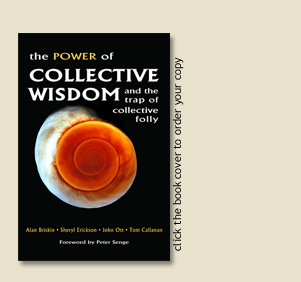 |

From a Review of The Power of Collective Wisdom and the Trap of Collective Folly by Ian Hughes What is the mysterious process that guides Quakers decision making during Meeting for Worship for Business? We are used to using mystical or supernatural language when we try to explain the process in Meeting for Worship for Business. We sit in silence waiting for the movement of the Spirit; we recognize That of God in each of us; we seek to find unity in Spirit; we make decisions in a spirit of worship. Phrases like these are hallowed by tradition and resonate with meaning for Friends who have participated in Worship for Business. Alan Briskin, with other members of the Collective Wisdom Initiative, has spent nine years researching in various settings how collective wisdom emerges through our living connection with each other and our interdependence. He has spoken to Quaker meetings in USA, and lists Quaker meetings among sites where collective wisdom emerges. As well as stories and examples to illustrate how collective wisdom has emerged in a range of cultures, settings, and traditions, this new book offers a set of practices to help realise key lessons. For example, Briskin and his colleagues explain six stances or attitudes which help us prepare for the emergence of collective wisdom. Though we use different words, they are all present in Meeting for Worship for Business. They are: deep listening; suspension of certainty; seeing whole systems and seeking diverse perspectives; respect for others in group discernment; welcoming all that is arising; and trust in the transcendent. Meetings may like to see if this book can stimulate us to live experimentally to enhance Quaker Meetings for Worship for Business. It provides secular terminology and descriptions which can help us to deepen our appreciation of practice, and complement our traditional Quaker language. The book may also help us place our unique practice in context with related processes, and enable us to apply Quaker insights to other settings. Paying attention to the chapters on collective folly just might save a Quaker Meeting from one of those periods of stress, polarisation or false agreement which from time to time descend, and make it so painfully difficult to restore a full and vibrant life in the spirit. Ian Hughes
|
 |
 |
 |
 |
 |
 |
 |